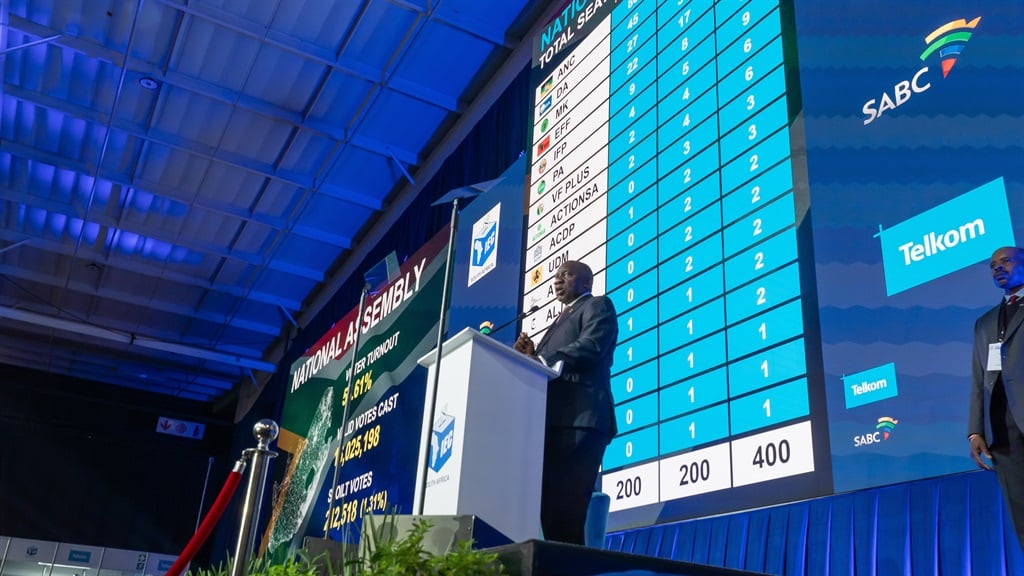
President Cyril Ramaphosa addresses attendees at the IEC's National Results Operations Centre in Midrand, Johannesburg, on Sunday. (Alfonso Nkunjana/News24)
- Investors are bracing for further market turmoil as ongoing coalition talks remain highly uncertain.
- There are also concerns that former president Jacob Zuma has alleged inconsistencies in the vote count and warned that his MKP party may demand a recount.
- An ANC-DA coalition would be best for markets
- For more financial news, News24 Business top page.
Investors are bracing for further turmoil in South Africa's financial markets after last week's general election produced no clear winner and the outcome of ongoing coalition talks remains highly uncertain.
The ANC fell short of a parliamentary majority for the first time since it came to power three decades ago, with supporters expressing anger over persistent poverty, unemployment and crime by boycotting the vote or backing rival candidates. Results released late Sunday showed the party won 40.2 percent of the vote in the May 29 vote.
The DA garnered 21.8% of the vote, while former president Jacob Zuma's new party, the Umkhonto we'Sizwe Party (MKP), had 14.6% and the EFF 9.5%. The latter two support increased state spending and nationalisation of mines and the central bank, and the possibility of them joining government and demanding populist policy changes has weighed heavily on South Africa's currency and debt. “Investors should be very worried because South Africa is at a crossroads,” said Anne Fruhauf, managing director at risk adviser Teneo. “At this point, any coalition outcome is pretty much plausible.”
READ | DA-ANC deal could see rand rise to 17.50 per dollar, experts say, but other outcomes will lead to further selling
The rand has fallen 2.7 percent against the dollar since voting began on May 29 as the extent of the ANC's defeat became clear. It was trading at around 18.83 rand to the dollar as of 8:15 a.m. on Monday. The cost of insuring the country's debt has risen by about 18 basis points during this time to 240.7 basis points. Yields on local currency bonds maturing in 2035 closed at 12.25 percent at the weekend, the highest level in a month.
A coalition government with the DA would be most favourable for markets, but “getting there will not be easy and will undoubtedly put pressure on ANC unity”, said Mark Borndo, senior credit research analyst at REDD Intelligence.
“The rand will remain pressured by uncertainty and could well breach the record level of 20 rand to the dollar,” he said. “The weaker rand is likely to trigger a repatriation of foreign capital in the short term, but the prospect of more restrained policy going forward will increase incentives for South African investors.”
Leaders of the main parties met over the weekend to hammer out a way forward but serious negotiations have not yet begun and it is expected to take several days to reach an agreement. The National Assembly must meet to choose a president within 14 days of the announcement of the results, but by law can hold an extension if the candidates cannot agree.
All the major parties have said they are open to a deal, but Zuma's MKP has made any alliance with the ANC conditional on President Cyril Ramaphosa stepping down – a condition ANC secretary-general Fikile Mbalula has said the party will never accept.
Ramaphosa's allies support a coalition government with the DA, but that option would face significant opposition within the ANC, according to people familiar with the matter who spoke on condition of anonymity because the talks are private.
“Opposition parties like the DA, MK and EFF will be trying hard to get an agreement done, but the internal dynamics of the ANC will be just as important,” Fruhauf said. “This could be a big internal battle.”
READ | Strong support for coalition government among ANC and DA voters – survey
Even if a power-sharing agreement can be reached, there is no guarantee it will stick, and local government-level arrangements in South Africa are any indication. In some major cities governed by multiple parties, power has shifted between parties, creating instability and leading to the near-halt of services like water and waste disposal.
Another cause for concern is President Zuma's warning that his party may request a recount, alleging discrepancies in the vote count. The Electoral Commission has denied there were any significant discrepancies, but a disputed result is hardly a sign of stability, especially in the eastern province of KwaZulu-Natal, where the MKP won almost half the vote.
Zuma was forced to step down by the ANC to halt a slide in electoral support after nearly nine years as a scandal-ridden president, and his arrest after refusing to testify in a corruption investigation sparked the worst riots and looting since the end of apartheid, leaving 354 people dead.

